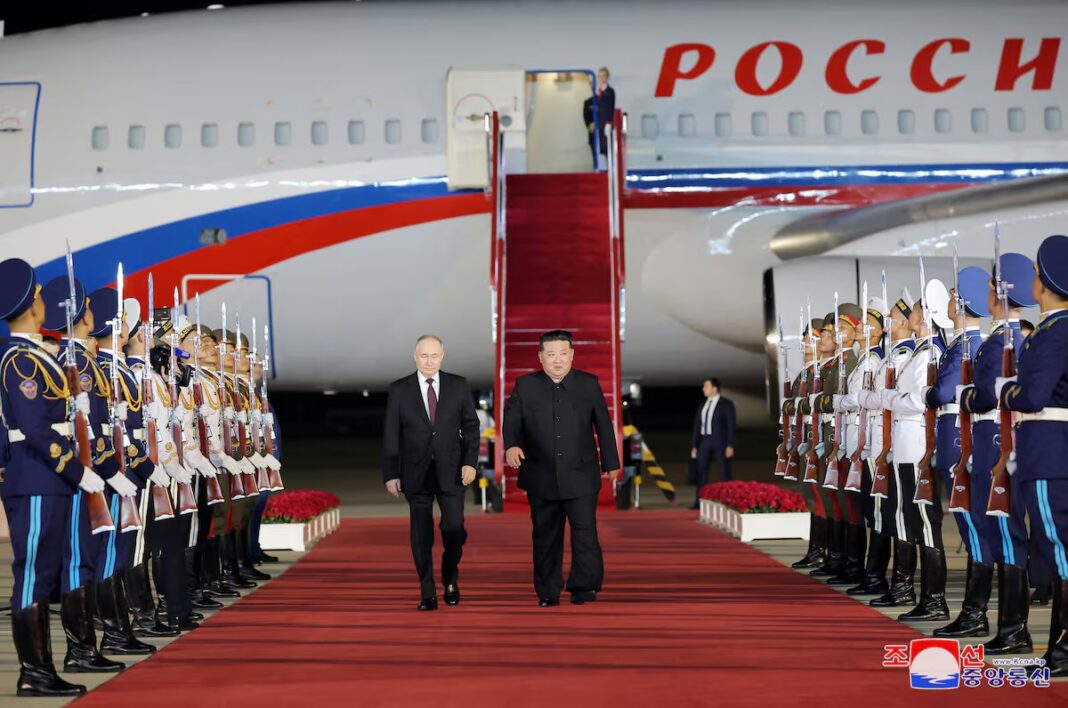North Korean leader Kim Jong Un gave Russian President Vladimir Putin a cordial welcome in Pyongyang on Wednesday. Marking Putin’s first visit to North Korea in 24 years. The visit, replete with grand ceremonies and cheering crowds. It also culminated in the signing of a significant agreement upgrading their bilateral ties to a “comprehensive strategic partnership”. This meeting signifies a turning point in Russia-North Korea relations, as both nations face increasing international isolation.
Unwavering Support and Strategic Dialogue
During the summit, Kim Jong Un expressed unconditional support for all Russian policies, including a firm alliance in Putin’s war with Ukraine. The leaders discussed various geopolitical issues and emphasized the importance of their partnership amidst a complex global security environment. Kim praised Russia’s efforts against what he termed the “hegemonic, imperialist policy of the United States and its allies.” He further affirmed North Korea’s full support for Russia’s military actions in Ukraine, describing the war as a “special military operation” aimed at protecting Russia’s sovereignty and territorial integrity.
Putin, in turn, appreciated North Korea’s consistent support for Russian policies. He highlighted the necessity of strategic dialogue between the two nations to address the evolving global security landscape. Their meeting at the Kumsusan Palace resulted in the signing of a comprehensive strategic partnership pact, laying the groundwork for broader cooperation. Putin’s foreign policy aide indicated that this pact would enhance collaboration between Russia and North Korea across various domains.
Celebratory Ceremonies and Mutual Praise
Putin’s arrival in Pyongyang was marked by an elaborate welcome ceremony, including an honor guard with mounted soldiers and a large crowd of civilians at Kim Il Sung Square. Children holding balloons and giant portraits of the two leaders adorned the scene, while national flags embellished the square’s main building. The atmosphere underscored the significance of Putin’s visit, described by North Korean state media as a demonstration of the invincibility and durability of their friendship and unity.
The agenda for the day included a gala concert, state reception, honor guards, document signings, and a joint statement to the media. Kim gave Putin a hug in spite of the late arrival, and during their drive to the state guest house, the two leaders exchanged “pent-up inmost thoughts”.The facade of the unfinished Ryugyong Hotel in Pyongyang was brightly lit with a giant message welcoming Putin, reflecting the high regard North Korea holds for the Russian leader.
Strategic Implications and Future Prospects
The visit highlights the strategic implications of the strengthened Russia-North Korea partnership. Both nations are leveraging their alliance to counterbalance U.S. and Western influence. Putin’s visit and the signed agreement underscore a shared vision for a new multi-polar world. North Korean state media hailed the partnership as an “engine for accelerating the building of a new multi-polar world,” with Putin’s visit reinforcing the resilience and permanence of their unity.
In an article for North Korea’s ruling party newspaper, Putin commended North Korea for resisting U.S. economic pressure and proposed developing alternative trade mechanisms not controlled by the West. He emphasized the potential for North Korea’s economic growth within an anti-Western economic bloc led by Russia, a proposition likely to appeal to Kim Jong Un.
Seoul and Washington, however, are concerned about the growing military links between North Korea and Russia. The United States and its allies fear that Russia might provide aid for North Korea’s missile and nuclear programs. Which were banned by the U.N. Security Council resolutions. Additionally, there are accusations that North Korea has supplied ballistic missiles and artillery shells used by Russia in the Ukraine conflict, though both Moscow and Pyongyang have denied such transfers.
Conclusion
Putin’s visit to Pyongyang marks a pivotal moment in Russia-North Korea relations. The comprehensive strategic partnership agreement signifies a deepening alliance aimed at countering Western influence. Additionally promoting a multi-polar world order. As both nations navigate international isolation, their collaboration could reshape geopolitical dynamics in the region and beyond. This renewed partnership not only strengthens their mutual support. But also sets the stage for enhanced economic and military cooperation in the face of global challenges.





